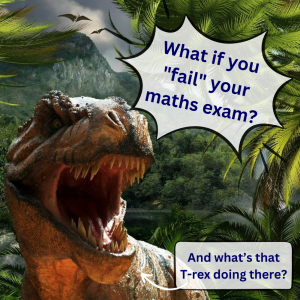 Hi, it's Veronika, in the midst of this year's disastrous grade boundaries across many exam boards, subjects and even exams (from GCSE, through iGCSE, to A level and more) I was contemplating my student's results this year. And about my student's results from all the years before. It was promoted also by a lot of discussions amongst my colleague tutors who were talking about this year's boundaries being especially harsh ever since the first results were revealed.
Hi, it's Veronika, in the midst of this year's disastrous grade boundaries across many exam boards, subjects and even exams (from GCSE, through iGCSE, to A level and more) I was contemplating my student's results this year. And about my student's results from all the years before. It was promoted also by a lot of discussions amongst my colleague tutors who were talking about this year's boundaries being especially harsh ever since the first results were revealed.
So how did my students do, do you wonder? Do I guarantee and gloat about a 100% pass rate? If you know a little bit about me, you already know the answer. But let's talk about it a bit more in-depth.
[And let's talk about the dinosaur in the room - see at the end of this article.]
First of all, I would never promise anyone 100% pass guarantee. It's a promise that nobody can deliver because ultimately the results depend on the students and how they perform on the exam day.
Secondly, I had about the same ratio of successes and not-so-much successes just as any year. Which I take as a big win because statistically, with tougher boundaries, there should've been been fewer successes overall. [Also, we'd need to discuss what success is as it's different for each student - not everyone is only needing the pass.]
See, a lot can go wrong when taking an exam which then results in not getting a grade that you hoped for. But that doesn't mean the end of the world.
These all examples are from my experience:
A long time ago, when I myself was a student back then, on my way towards my maths degree, I was tutoring a student for her exams. She was doing great in our lessons and repeatedly passing her mocks in home settings - invigilated by me personally so I know that the exam conditions were met. Yet she couldn't pass her exams, even repeatedly due to her exam-induced anxiety each time she would attempt to sit the maths exams. In the end, she decided to re-take a course, go back two years with her education and start an alternative route that allowed her to not have to sit specifically maths exams. So while she doesn't have her maths grade, she has still more than average maths knowledge due to a lot of work she put in over the years to her studies. And she could carry on with her further education, just needed to find the right way forward.
Quite many years later, I started tutoring a student with complex SEN and our first goal was to resit GCSE in order to get a B (that's today's 6) so he would be better suited for his intended BTEC maths course (to get an equivalent of A level maths - just in a setting that suited him better due to his additional needs). He was on a good path towards the B and although not too far from it, missed that grade and got yet another C. That didn't stop us from pursuing his maths studies further and fast forward 7 years, we are finishing together his engineering university degree. And the maths we were doing at uni wasn't just fun and games, I can assure you, yet we still carried onwards. That's how far one can go with "just a C" (that's today's 4-5) in maths.
Around the same time, I was tutoring a student for his A level maths. He wanted to get an A to get to the university of his choice. Quite a normal scenario, right? He missed A by ONE MARK! (And one more subject, unrelated to our tuition, also didn't work out, to be fair.) There were other options this student could pursue instead. But he decided he would take a gap year and would resit maths (and the other subject). One year later, I got him to that "solid A" and he was off to study at Durham University just as he wished.
So these are a few examples of students who "failed" with me yet we found a way to go forward.
There are also students who often find me after they took (and didn't pass) their exams and want to learn with me for a resit. Resits so far have way higher success rates than the first attempts, and I'd expect that's likely the same across other subjects. So if you can take a resit, go for it. (With or without me, that's not relevant.)
But it might be good to be aware of possible alternatives you might have.
What to do if you fail your exams?
(especially the so-dreaded but so-needed GCSE maths)
Besides the obvious such as getting your results remarked (in case there were some so-needed few marks lost) and/or resitting the same exam again later (for maths, you can go for a resit in November or May), you might want to consider some less usual but equally helpful alternatives (depending on your personal situation).
Switching from Foundation to Higher tier
(sounds mad, I know, but hear me out)
Let's see an example of a student of mine, who I was tutoring when I was working in a tuition centre in London (so that was some time pre-Covid, just around the time when GCSE was changing from A*-C to 9-1 system). Being borderline pass, he was put up in a Foundation group by his school. In our lessons, I saw that any mocks he attempted he couldn't pass. He was maths-savvy enough, but he didn't manage to get that many marks on a paper as needed for a Foundation pass. I suggested trying a Higer paper instead. To get a pass, you need way fewer marks on a Higher paper (although you need to up your maths game a bit). He did pass right away on his first Higher paper mock.
[As this student was introduced to me through a tuition centre, I wasn't in direct contact with the family and couldn't get info about the results later on, also due to the fact that I moved and had to stop working in the centre. I do believe though that this student took the Higher in the end and got a pass.]
Switching the exams completely
(but what for, you ask)
There are also other alternatives, such as switching to iGCSE instead of GCSE. This is an option accessible to all students in a school, home educated students and also adult learners. While it is not always possible for all subjects due to a variety of reasons, hear me out why this could be an alternative for you when it comes to getting a pass at maths.
iGCSE maths is an exam comparable to GCSE. While some schools and colleges might be at first reluctant about this certification, it is widely recognised equivalent alternative to GCSE and nowadays there's nearly no problem at all to get your iGCSE accepted the same way as GCSE If at all in doubt, you might want to have a word with the appropriate college's representative beforehand just to be confident that everyone is on board before you decide to go for this alternative to GCSE.
Now, what makes iGCSE a better option to get your pass in maths?
• 2 papers only instead of 3 (less potential exam stress).
• Both papers are with a calculator (students feel generally more confident when working with a calculator).
A bit of a neutral piece of information but it's worth mentioning:
• The style of the questions is slightly different so this can either be an advantage or a disadvantage depending on what kind of learner you are and what suits you best.
• As it's only two papers, each paper takes longer: 2 hrs (100 marks) for iGCSE instead of 1.5 hrs (80 marks) for GCSE.
[While it's a longer exam then, iGCSE actually gives on average 1.2 minutes per mark while GCSE allows on average only 1.125 min per mark... so technically, you get more time to gather each single mark needed to get the grade you want.]
But of course, nothing is just rainbows and unicorns, so here are also listed some potential disadvantages. I don't want to hide anything from you:
• The iGCSE is not regulated in terms of the syllabus in the same way as GCSE is, so across various exam boards or even within the exam boards with regards to different specifications, there's quite a variability in terms of difficultness (try to compare iGCSE maths Edexcel Higher Specification A and B so you'll know what I mean).
• There are a few advanced topics included in iGCSE maths - such as calculus or advanced statistics depending on the specifications of each exam board, best comparable to Further GCSE maths.
While this looks like not necessarily more advantages than disadvantages, none of that needs to be a problem. If you choose the right exam board and specification, you'll end up with a "nice" exam to work towards. And if you're aiming for the pass, you don't have to be worried about any advanced maths. That's for top graders and not needed for getting a grade 4, 5 or even 6.
There are also options to sit quite a different exam that is also equivalent of a pass in GCSE. For example Function Skills Level 2. But more about this qualification some other time.
How to get these alternative qualifications?
One of the routes would be to ask your local school or college whether they offer these kinds of exams and whether they take external candidates (if you're not a student there already). Another way is to find a suitable exam centre that offers the exam of your choice. It is quite a common route for home educated students and adult learners and nobody can stop you from taking an external exam if you are in a full-time education as well. While it's a bit of a costly adventure, it's a route worth investigating (each exam centre has its own pricing list, so the best is to ask - usually the prices per exam are somewhere in the range of £150 - £250).
You don't have to study anywhere officially, you can be a self-learner, attend a course elsewhere or have a private tutor. You just book the exams. It's actually a very easy process in that regard.
Let's get back to the beginning now...
With all the above said, now you can see why if anyone guarantees a 100% pass rate (or in a better scenario, they just comment on their current 100% pass rate) I can guarantee you that either they haven't been working with students long enough, or they just ditch the underperforming students (shortly) before the exams so they can wash their hands of the students who have a higher chance of not passing, or they only take on students who are already on a good path to rather a higher grade so a pass is pretty much expected. One of these or all of the above will likely be true for anyone offering help to students with a guarantee of a 100% pass rate or saying they have so far a 100% pass rate.
You might know, that I am none of the above. I do support students who have a hard time getting to their pass grade, I do stick with everyone until the very last moment and what's most important, I offer help afterwards, if things don't go the way we planned. It doesn't always have to mean that we would need to carry on with tuition. A well-meant advice from an experienced specialist can set you on a new path that you might've not even considered at first but might be more suitable than what your previous school (or yourself if you were home educated) tried before.
I hope this sparks a bit of good vibes for those who perhaps weren't as fortunate with their exams and gave you some food for thought.
I'd love to hear from you if you need some advice or if you find yourself in a situation where you are worried about perhaps not passing your exam (or maybe it already happened) and you're looking for a way to move onwards the best way.
Remember, not passing your exam is not the end of the world. It may mean an alteration of your plans or postponing your educational journey but there's always a way forward. The world is full of successful people who didn't quite pass their exams. I'm sure if you search for it, you'll find a lot of interesting and inspirational examples. It's up to you what path you want to take - the important thing is to know that the path is there and not only one. They're just waiting to be discovered.
Now, I still owe you the T-rex explanation.
Is anyone a fan of Jurassic Park? And is anyone aware of Steven Spielberg being rejected by a film school? Right... Well, that didn't stop him from making loads of amazing movies. And likely the most famous one is his Jurassic Park.
So here you go, that's why we have the roaring T-rex here with us today. To remind you that when things don't go as you planned, don't give up, find a way to carry on with your plans and dreams.



